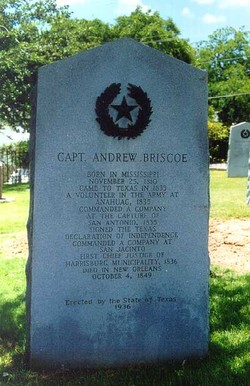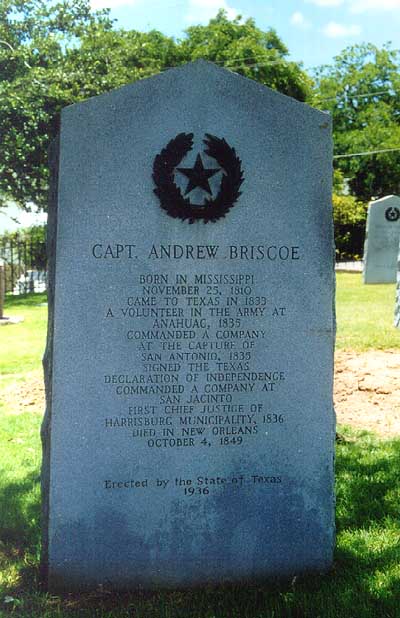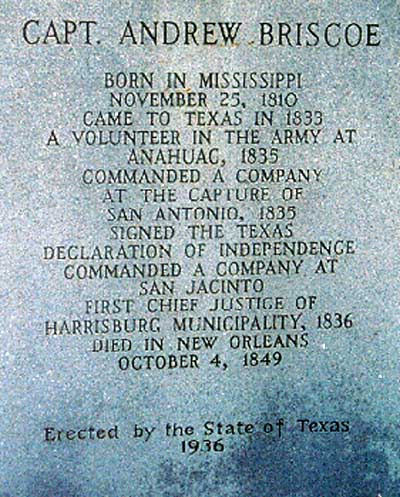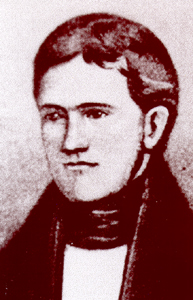~
Andrew, the eldest of Parmenas' twelve children and the subject of this sketch, was born, on the 25th day of November, 1810, in Adams county, Mississippi. Until he was sixteen years of age Andrew Briscoe spent his time on his father's plantation in Claiborne county, Mississippi, except when at school, at Clinton, in Hines county. At the age of sixteen he was sent to college in Kentucky, where he enjoyed good advantages in respect to higher mental training. He read law under General John A. Quitman, of Jackson, Mississippi, then a leading lawyer and a man of much reputation throughout the South. Having about this date married an estimable young lady of his native State, Miss Mary House, Mr. Briscoe located on a plantation near his father's, where he contemplated entering at once on a professional career; but before he was fairly established in the law his wife died and saddened and unsettled by the loss, he yielded to the impulse of the occasion, abandoned the law, quit his home and came to Texas. Here he became interested in schemes both of a financial and political nature, and at once identified himself with the colonists, whose cause he warmly espoused. He made several trips about this time between Mississippi and points in east Texas, and finally, in 1835, purchased a a stock of goods, which he shipped to Anahuac preparatory to embarking in the mercantile business at that place. It was here and only a short time after he located that his name first became associated with an event of historical importance, and one in the chain of causes which soon led to the revolution. This event is vaguely referred to by most of the historians as the "affair at Anahuac," in connection with which however no names are given. The facts are that soon after Mr. Briscoe moved his stock of goods to Anahuac the town was invested by a garrison of forty men under Captain Tenorio, who, under pretext of collecting duties on imports, siezed the goods introduced by Mr. Briscoe and forbade his making any disposition of them until a permit had been obtained from the Mexican authorities, which permit could be obtained only on payment of a certain sum of money. Feeling that this regulation, if not unlawful, was at any rate an act of tyranny to which as an American he could not submit, he resisted the order, and to make a test of the matter sold some of the goods to DeWitt C. Harris, of Harrisburg, the removal of which brought on a conflict between the Briscoe party and the Mexican soldiery. In this conflict a young man of the Briscoe party, named William Smith was shot, but afterward recovered, and Mr. Briscoe and his friend Harris were siezed and placed in prison.
This affair occurred about the l0th of June. A report of it was sent to the authorities at San Felipe, and news of it quickly spread throughout the settlements. It excited a great deal of feeling. The friends of Messrs. Briscoe and Harris in and about Harrisburg, prominent among whom were William B. Travis and Patrick Jack, raised a company of volunteers, mounting a four-pound cannon on board the sloop Ohio, sailed to Anahuac, liberated the prisoners and disbanded the garrison. This served to still further increase the excitement, being the source of considerable glorification on the part of the war party, and the cause of much criticism upon the part of those who were opposed to violent measures.
But the fires of the revolution were now fully under way, and Briscoe, having been robbed of his property, and with no business interests on hand, turned his attention to the task that was then engaging the minds of many of the most active patriots of the period, namely,-the freedom of the colonies from the tyranny of Mexico. He entered on the work with an enthusiasm quickened by a lively sense of the personal injury and insult which had been inflicted on him in the affair at Anahuac. All of the ensuing summer and most of the fall was spent by him among the settlers, with whom, in company with others of the patriot band, he labored to show the necessity and feasibility of an open, united and vigorous revolt against Mexican authority. These efforts, in connection with the continued acts of tyranny on the part of the Mexicans, resulted, as is known, in arousing a strong feeling of resistance to the established order of things and one which needed but the occasion to break into open rebellion. The occasion came and after the spirited and successful conflicts at Goliad and Gonzales, the battle of Conception followed. Mr. Briscoe took part in this battle at the head of a company called the Liberty Volunteers, which he raised. He was also present and took part in the storming of San Antonio, the first real fighting, as he was afterward accustomed to say, that the colonists did during the period of the Revolution. He remained in the vicinity of San Antonio until February, 1836, when, having been elected by the people of Harrisburg municipality to represent them in the convention which met at Washington, he came on and attended the sitting of that convention, thus becoming one of the signers of the Declaration of Independence. From this body he hastened to the field again, and, in command of a company of regulars joined the army on its retreat under Houston, and took part in the battle of San Jacinto, and thus shared in the glory of that great day.
The war over and the independence of the colonists established, Mr. Briscoe again turned his attention to the pursuits of peace, going to New Orleans, where he purchased a stock of goods, presumably for the purpose of entering the mercantile business. But, upon the election of General Houston to the presidency of the Republic in October, 1836, he tendered to Mr. Briscoe the office of Chief Justice of Harris county, which the latter accepted, and in consequence gave up his mercantile interests for the purpose of devoting himself exclusively to the duties connected with his office. This office was an important one, not only because of its territorial jurisdiction, Harris county then embracing a much larger area of country than now, but also because of the various functions connected with it. Judge Briscoe at once took charge of his office, his official and personal residence becoming Houston, the newly established county seat.
It was at Harrisburg that he met, and on the 17th day of August, 1837, married. Miss Mary Jane Harris, then a young lady of eighteen, recently from school in New York State, but a daughter of John R. Harris, the founder of Harrisburg, and one of Texas' earliest settlers. Shortly after his marriage Judge Briscoe moved up to Houston, and, having purchased the lot on the northeast corner of Main street and Prairie avenue, erected there the first two-story dwelling put up in the town. This house long remained one of the old landmarks of Houston, having in fact only in recent years been removed to give place to the present Prince building. Judge Briscoe served as Chief Justice of Harris county for four years, after which he renounced public life, and in the face of all sorts of flattering offers of personal preferment, persistently refused to allow his name to be used in contests for any sort of public office. He moved his residence from Houston to Harrisburg, where he built a large brick dwelling, and surrounded himself with the means of social and intellectual enjoyment, and became engrossed with business pursuits and the pleasures of home.
One of the chief objects of his attention at that time was the Harrisburg & Brazos River Railroad, a charter for which he obtained from the Congress of the Republic in 1839, and which bears the distinction of being the first railway ever chartered west of the Mississippi river. Into this scheme Judge Briscoe seems to have entered with great zeal, personally superintending the breaking and grading of the first mile or so of it with his own slaves. The following item concerning operations on this road appeared in the Morning Star, published at Houston, under date of May 16, 1840: "Wanted: To hire sixty negro men, for which good wages will be given and secured, to work on the Harrisburg & Brazos Railroad. They will be taken for not less than six months, and kept two years if desired. - A. Briscoe." In 1845, while living in retirement at Harrisburg, Judge Briscoe received from Governor Anson Jones the appointment of Justice of the Peace for the precinct in which he lived, his commission being dated in the latter part of the last month of the last year of the Republic, and was one of the last commissions ever issued under authority of the Republic. Like all of those who had witnessed the birth of the Republic and had gone with it through its early struggles, he was devoted to it with that impulsive enthusiasm and ardent attachment begotten of true patriotism and love of liberty, and he watched the shaping of events affecting its welfare with great interest, and, not infrequently, with feelings of apprehension. He opposed annexation, and never came to believe that the change was for the best.
In the spring of 1849 Judge Briscoe, having disposed of some of his interests in Texas, went to New Orleans for the purpose of engaging in the banking business; but, before he had got his affairs well under way there, he was taken sick, and on October 4th of the same year died. His remains were buried at the old family burying-ground in Claiborne county, Mississippi. Up to the date of his death he was actively engaged in business pursuits. Even alter going to New Orleans his mind was full of enterprises for Texas, one of which was a transcontinental railroad along the line since covered by the Southern Pacific system. He wrote a number of articles, which he published in the newspapers of New Orleans, setting forth the advantages of such a road. His estate at his death consisted largely of Texas lands, the cheapness of which, at an earlier date, had enabled him to make excellent provision for his family. He left surviving a widow and four children, all of whom are still living. The eldest son, Parmenas, has always made his home with his widowed mother, in Houston, never having married. Andrew B. is a banker of Floresville, but resides at San Antonio. The two daughters both live in Houston, the elder, Jessie, being the wife of Captain M.G. Howe, vice-president and general manager of the Houston, East & West Texas Railroad; and the younger, Adele L., being the wife of Major M. Looscan, a leading member of the Harris county bar. Mrs. Briscoe is now one of Houston's oldest settlers, and is one of the really historic women of the State. She has lived on Texas soil for fifty-seven years, and, besides being the widow of one of Texas' most eminent patriots, is a member of one of the most prominent families of the State. Her father, John R. Harris, a native of New York, and a descendant of John Harris, for whom Harrisburg, Pennsylvania, was named, came to Texas in 1824 as a member of Moses Austin's colony, and founded the town of Harrisburg, and for him Harris county was named. Her three brothers, DeWitt C., Louis L. and John B. Harris, were all prominent in the history of this section of the State in an earlier day, particularly DeWitt C.; while Louis L. became also a pioneer of California, where he figured conspicuously in the early days of that country. (Source: History of Texas Biographical History of the Cities of Houston and Galveston (1895)
~
Andrew, the eldest of Parmenas' twelve children and the subject of this sketch, was born, on the 25th day of November, 1810, in Adams county, Mississippi. Until he was sixteen years of age Andrew Briscoe spent his time on his father's plantation in Claiborne county, Mississippi, except when at school, at Clinton, in Hines county. At the age of sixteen he was sent to college in Kentucky, where he enjoyed good advantages in respect to higher mental training. He read law under General John A. Quitman, of Jackson, Mississippi, then a leading lawyer and a man of much reputation throughout the South. Having about this date married an estimable young lady of his native State, Miss Mary House, Mr. Briscoe located on a plantation near his father's, where he contemplated entering at once on a professional career; but before he was fairly established in the law his wife died and saddened and unsettled by the loss, he yielded to the impulse of the occasion, abandoned the law, quit his home and came to Texas. Here he became interested in schemes both of a financial and political nature, and at once identified himself with the colonists, whose cause he warmly espoused. He made several trips about this time between Mississippi and points in east Texas, and finally, in 1835, purchased a a stock of goods, which he shipped to Anahuac preparatory to embarking in the mercantile business at that place. It was here and only a short time after he located that his name first became associated with an event of historical importance, and one in the chain of causes which soon led to the revolution. This event is vaguely referred to by most of the historians as the "affair at Anahuac," in connection with which however no names are given. The facts are that soon after Mr. Briscoe moved his stock of goods to Anahuac the town was invested by a garrison of forty men under Captain Tenorio, who, under pretext of collecting duties on imports, siezed the goods introduced by Mr. Briscoe and forbade his making any disposition of them until a permit had been obtained from the Mexican authorities, which permit could be obtained only on payment of a certain sum of money. Feeling that this regulation, if not unlawful, was at any rate an act of tyranny to which as an American he could not submit, he resisted the order, and to make a test of the matter sold some of the goods to DeWitt C. Harris, of Harrisburg, the removal of which brought on a conflict between the Briscoe party and the Mexican soldiery. In this conflict a young man of the Briscoe party, named William Smith was shot, but afterward recovered, and Mr. Briscoe and his friend Harris were siezed and placed in prison.
This affair occurred about the l0th of June. A report of it was sent to the authorities at San Felipe, and news of it quickly spread throughout the settlements. It excited a great deal of feeling. The friends of Messrs. Briscoe and Harris in and about Harrisburg, prominent among whom were William B. Travis and Patrick Jack, raised a company of volunteers, mounting a four-pound cannon on board the sloop Ohio, sailed to Anahuac, liberated the prisoners and disbanded the garrison. This served to still further increase the excitement, being the source of considerable glorification on the part of the war party, and the cause of much criticism upon the part of those who were opposed to violent measures.
But the fires of the revolution were now fully under way, and Briscoe, having been robbed of his property, and with no business interests on hand, turned his attention to the task that was then engaging the minds of many of the most active patriots of the period, namely,-the freedom of the colonies from the tyranny of Mexico. He entered on the work with an enthusiasm quickened by a lively sense of the personal injury and insult which had been inflicted on him in the affair at Anahuac. All of the ensuing summer and most of the fall was spent by him among the settlers, with whom, in company with others of the patriot band, he labored to show the necessity and feasibility of an open, united and vigorous revolt against Mexican authority. These efforts, in connection with the continued acts of tyranny on the part of the Mexicans, resulted, as is known, in arousing a strong feeling of resistance to the established order of things and one which needed but the occasion to break into open rebellion. The occasion came and after the spirited and successful conflicts at Goliad and Gonzales, the battle of Conception followed. Mr. Briscoe took part in this battle at the head of a company called the Liberty Volunteers, which he raised. He was also present and took part in the storming of San Antonio, the first real fighting, as he was afterward accustomed to say, that the colonists did during the period of the Revolution. He remained in the vicinity of San Antonio until February, 1836, when, having been elected by the people of Harrisburg municipality to represent them in the convention which met at Washington, he came on and attended the sitting of that convention, thus becoming one of the signers of the Declaration of Independence. From this body he hastened to the field again, and, in command of a company of regulars joined the army on its retreat under Houston, and took part in the battle of San Jacinto, and thus shared in the glory of that great day.
The war over and the independence of the colonists established, Mr. Briscoe again turned his attention to the pursuits of peace, going to New Orleans, where he purchased a stock of goods, presumably for the purpose of entering the mercantile business. But, upon the election of General Houston to the presidency of the Republic in October, 1836, he tendered to Mr. Briscoe the office of Chief Justice of Harris county, which the latter accepted, and in consequence gave up his mercantile interests for the purpose of devoting himself exclusively to the duties connected with his office. This office was an important one, not only because of its territorial jurisdiction, Harris county then embracing a much larger area of country than now, but also because of the various functions connected with it. Judge Briscoe at once took charge of his office, his official and personal residence becoming Houston, the newly established county seat.
It was at Harrisburg that he met, and on the 17th day of August, 1837, married. Miss Mary Jane Harris, then a young lady of eighteen, recently from school in New York State, but a daughter of John R. Harris, the founder of Harrisburg, and one of Texas' earliest settlers. Shortly after his marriage Judge Briscoe moved up to Houston, and, having purchased the lot on the northeast corner of Main street and Prairie avenue, erected there the first two-story dwelling put up in the town. This house long remained one of the old landmarks of Houston, having in fact only in recent years been removed to give place to the present Prince building. Judge Briscoe served as Chief Justice of Harris county for four years, after which he renounced public life, and in the face of all sorts of flattering offers of personal preferment, persistently refused to allow his name to be used in contests for any sort of public office. He moved his residence from Houston to Harrisburg, where he built a large brick dwelling, and surrounded himself with the means of social and intellectual enjoyment, and became engrossed with business pursuits and the pleasures of home.
One of the chief objects of his attention at that time was the Harrisburg & Brazos River Railroad, a charter for which he obtained from the Congress of the Republic in 1839, and which bears the distinction of being the first railway ever chartered west of the Mississippi river. Into this scheme Judge Briscoe seems to have entered with great zeal, personally superintending the breaking and grading of the first mile or so of it with his own slaves. The following item concerning operations on this road appeared in the Morning Star, published at Houston, under date of May 16, 1840: "Wanted: To hire sixty negro men, for which good wages will be given and secured, to work on the Harrisburg & Brazos Railroad. They will be taken for not less than six months, and kept two years if desired. - A. Briscoe." In 1845, while living in retirement at Harrisburg, Judge Briscoe received from Governor Anson Jones the appointment of Justice of the Peace for the precinct in which he lived, his commission being dated in the latter part of the last month of the last year of the Republic, and was one of the last commissions ever issued under authority of the Republic. Like all of those who had witnessed the birth of the Republic and had gone with it through its early struggles, he was devoted to it with that impulsive enthusiasm and ardent attachment begotten of true patriotism and love of liberty, and he watched the shaping of events affecting its welfare with great interest, and, not infrequently, with feelings of apprehension. He opposed annexation, and never came to believe that the change was for the best.
In the spring of 1849 Judge Briscoe, having disposed of some of his interests in Texas, went to New Orleans for the purpose of engaging in the banking business; but, before he had got his affairs well under way there, he was taken sick, and on October 4th of the same year died. His remains were buried at the old family burying-ground in Claiborne county, Mississippi. Up to the date of his death he was actively engaged in business pursuits. Even alter going to New Orleans his mind was full of enterprises for Texas, one of which was a transcontinental railroad along the line since covered by the Southern Pacific system. He wrote a number of articles, which he published in the newspapers of New Orleans, setting forth the advantages of such a road. His estate at his death consisted largely of Texas lands, the cheapness of which, at an earlier date, had enabled him to make excellent provision for his family. He left surviving a widow and four children, all of whom are still living. The eldest son, Parmenas, has always made his home with his widowed mother, in Houston, never having married. Andrew B. is a banker of Floresville, but resides at San Antonio. The two daughters both live in Houston, the elder, Jessie, being the wife of Captain M.G. Howe, vice-president and general manager of the Houston, East & West Texas Railroad; and the younger, Adele L., being the wife of Major M. Looscan, a leading member of the Harris county bar. Mrs. Briscoe is now one of Houston's oldest settlers, and is one of the really historic women of the State. She has lived on Texas soil for fifty-seven years, and, besides being the widow of one of Texas' most eminent patriots, is a member of one of the most prominent families of the State. Her father, John R. Harris, a native of New York, and a descendant of John Harris, for whom Harrisburg, Pennsylvania, was named, came to Texas in 1824 as a member of Moses Austin's colony, and founded the town of Harrisburg, and for him Harris county was named. Her three brothers, DeWitt C., Louis L. and John B. Harris, were all prominent in the history of this section of the State in an earlier day, particularly DeWitt C.; while Louis L. became also a pioneer of California, where he figured conspicuously in the early days of that country. (Source: History of Texas Biographical History of the Cities of Houston and Galveston (1895)
Bio by: Screwtape
Family Members
Advertisement
Advertisement















